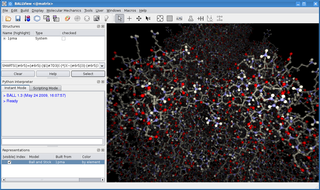The Q Public License (QPL) is a non-copyleft license, created by Trolltech for its free edition of the Qt. It was used until Qt 3.0, as Trolltech toolkit version 4.0 was released under GPL version 2.

Scilab is a free and open-source, cross-platform numerical computational package and a high-level, numerically oriented programming language. It can be used for signal processing, statistical analysis, image enhancement, fluid dynamics simulations, numerical optimization, and modeling, simulation of explicit and implicit dynamical systems and symbolic manipulations.

The National Institute for Research in Digital Science and Technology (Inria) is a French national research institution focusing on computer science and applied mathematics. It was created under the name French Institute for Research in Computer Science and Automation (IRIA) in 1967 at Rocquencourt near Paris, part of Plan Calcul. Its first site was the historical premises of SHAPE, which is still used as Inria's main headquarters. In 1980, IRIA became INRIA. Since 2011, it has been styled Inria.
Source-available software is software released through a source code distribution model that includes arrangements where the source can be viewed, and in some cases modified, but without necessarily meeting the criteria to be called open-source. The licenses associated with the offerings range from allowing code to be viewed for reference to allowing code to be modified and redistributed for both commercial and non-commercial purposes.
The GNU Scientific Library is a software library for numerical computations in applied mathematics and science. The GSL is written in C; wrappers are available for other programming languages. The GSL is part of the GNU Project and is distributed under the GNU General Public License.
CeCILL is a free software license adapted to both international and French legal matters, in the spirit of and retaining compatibility with the GNU General Public License (GPL).
GNU Readline is a software library that provides in-line editing and history capabilities for interactive programs with a command-line interface, such as Bash. It is currently maintained by Chet Ramey as part of the GNU Project.
A geometric modeling kernel is a solid modeling software component used in computer-aided design (CAD) packages. Available modelling kernels include:

Macaulay2 is a free computer algebra system created by Daniel Grayson and Michael Stillman for computation in commutative algebra and algebraic geometry.
Bigloo is a programming language, a dialect of the language Lisp, an implementation of the language Scheme. It is developed at the French IT research institute French Institute for Research in Computer Science and Automation (INRIA). It is oriented toward providing tools for effective and diverse code generation that can match the performance of hand-written C or C++. The Bigloo system contains a Scheme compiler that can generate C code and Java virtual machine (JVM) or .NET Framework (.NET) bytecode. As with other Lisp dialects, it contains an interpreter, also termed a read-eval-print loop (REPL). It is free and open-source software. The run-time system and libraries are released under a GNU Lesser General Public License (LGPL). The compiler and programming tools are released under a GNU General Public License (GPL).
JTS Topology Suite is an open-source Java software library that provides an object model for Euclidean planar linear geometry together with a set of fundamental geometric functions. JTS is primarily intended to be used as a core component of vector-based geomatics software such as geographical information systems. It can also be used as a general-purpose library providing algorithms in computational geometry.

BALL is a C++ class framework and set of algorithms and data structures for molecular modelling and computational structural bioinformatics, a Python interface to this library, and a graphical user interface to BALL, the molecule viewer BALLView.
The Library of Efficient Data types and Algorithms (LEDA) is a proprietarily-licensed software library providing C++ implementations of a broad variety of algorithms for graph theory and computational geometry. It was originally developed by the Max Planck Institute for Informatics Saarbrücken. Since 2001, LEDA is further developed and distributed by the Algorithmic Solutions Software GmbH.

The GNU General Public License is a series of widely used free software licenses or copyleft that guarantee end users the four freedoms to run, study, share, and modify the software. The license was the first copyleft for general use and was originally written by Richard Stallman, the founder of the Free Software Foundation (FSF), for the GNU Project. The license grants the recipients of a computer program the rights of the Free Software Definition. These GPL series are all copyleft licenses, which means that any derivative work must be distributed under the same or equivalent license terms. It is more restrictive than the Lesser General Public License and even further distinct from the more widely used permissive software licenses BSD, MIT, and Apache.
Jean-Daniel Boissonnat is a French computer scientist, who works as a director of research at the French Institute for Research in Computer Science and Automation (INRIA). He is an invited professor of computational geometry at the Collège de France, holding the Chair in Informatics and Computational Sciences for 2016–2017.
Mariette Yvinec is a French researcher in computational geometry at the French Institute for Research in Computer Science and Automation (INRIA) in Sophia Antipolis. She is one of the developers of CGAL, a software library of computational geometry algorithms.
Monique Teillaud is a French researcher in computational geometry at the French Institute for Research in Computer Science and Automation (INRIA) in Nancy, France. She moved to Nancy in 2014 from a different INRIA center in Sophia Antipolis, where she was one of the developers of CGAL, a software library of computational geometry algorithms.




